第三版大学英语精读第一册(教桉)全教程文件
- 格式:doc
- 大小:327.51 KB
- 文档页数:60
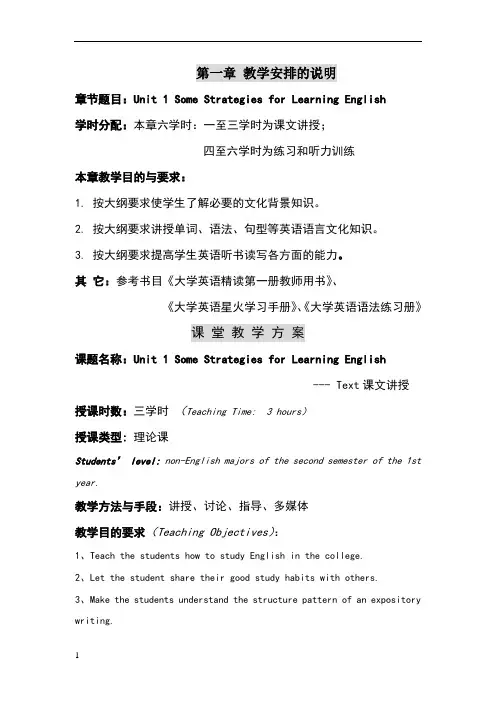
第一章教学安排的说明章节题目:Unit 1 Some Strategies for Learning English学时分配:本章六学时:一至三学时为课文讲授;四至六学时为练习和听力训练本章教学目的与要求:1. 按大纲要求使学生了解必要的文化背景知识。
2. 按大纲要求讲授单词、语法、句型等英语语言文化知识。
3. 按大纲要求提高学生英语听书读写各方面的能力。
其它:参考书目《大学英语精读第一册教师用书》、《大学英语星火学习手册》、《大学英语语法练习册》课堂教学方案课题名称:Unit 1 Some Strategies for Learning English--- Text课文讲授授课时数:三学时(Teaching Time: 3 hours)授课类型:理论课Students’ level: non-English majors of the second semester of the 1st year.教学方法与手段:讲授、讨论、指导、多媒体教学目的要求(Teaching Objectives):1、Teach the students how to study English in the college.2、Let the student share their good study habits with others.3、Make the students understand the structure pattern of an expository writing.4、About the text, Ss should grasp the text content, text structure, basic vocabularies and require grammatical points of the section.教学重点、难点:1)Words:average;case;commit;occupy;concentrate;enable;adequate;organize;double;m ention; confuse; purpose; permanent2)Phrases & Expression:fill in; decide on ; be aware of; set aside; as well; look over;make use of ; go over; lead to3)Grammar:as well, so…that…;too…to …; as…as…教学内容及组织安排(Teaching Procedures):I. Pre-reading ActivitiesStep one (presentation)2.Make sure that they can pronounce each new word in the vocabulary3.Explain the important words with examplesVocabulary:average: a.ordinary; normal. What is the monthly income of an average family in LanzhouI was average in my class though I had hoped I would bettermean(平均的). The average age of the students in that class is 20.The average income of these teachers is 1000 yuan per month.n. (collocation) on (the) average: taking account over a period. When he was a student in that university, he failed one subject peryear on average.case: (multimodal word)1.actual condition, actual state of affairs.. Is it the case that you fail the examinationin any case: whatever happens or may have happened. in any case, I will arrive there at 8 tomorrow.In no case: in no circumstances.. In no case should we give in .(predicate use inversion)in case: because of the possibility of sth. happening.. Take an umbrella with you in case it (should) rain/rains.in case of: if sth. Happens . In case of the rain, take a shelter.In the case of: as to . In the case of my elder sister, she doesn’t like surfing the netaddition: n.(1) in addition: besides. . In addition, he studies French well .(2)in addition to sb./sth.. When I was a middle school student I read a romantic novelin addition to a hysterical novel every month. commit:vt.(1) decide to give (time,money,etc.) for special usage.. They are committing money to offer the opportunityeducation of accepting to the poor children.(2) perform: . commit suicide, errors, a crime, a mistake.(3) commit oneself to: make oneself responsible; under take.. She has committed herself to give birth to a child for him.occupy: take up, fill(1)be occupied in (doing) sth.: involved or busy.. He is occupied in translating the modern Chinese novel intoEnglish.(2)occupy oneself in (doing) sth: fill one’s time or keep oneself busy.young man occupied himself in making experiments.entertain: (1)entertain sb. at/to dinner;(2) entertain sb. With. The householder/host entertain the guests with a feast/big dinner.aware: be/ become aware of :fully aware of the gravity of the situation.enable: (1)enable sb. to do sth.. The student’s identity cards enable the students to travel by train on half price.(2) enable support of the committee members enabled the passage ofthe bell.(3) “en+ noun/adjective”: change the word to be verb , meaning ”. en+large=enlarge(to make large) en+rich=enrich( to make rich) adequate: (1) as much as one needs:a. suggesting the amount is satisfactory. There hundred yuan per month is not adequate to support a family of three in a city.b. enough:(of quality) as great as is needed. It is the most general term.. Live got enough of you.(too much complaint)c. sufficient: enough, written language.(literary language). Toby’s father has saved sufficient money to support hiscollege study.(2)suitable ; fit collocation: be adequate to (doing) sth.. Do you think he is adequate to (accomplishing) the task concentrate(on/upon):vi. pay close attention tovt. come or bring together at one place.. concentrate all the forces.content: what is written in a book, etc.. The contents of the book is printed in bold typeportion: a portion of …, (a series of, a species of). A large portion of his articles was published.A large number of his articles were published.mention: (1) vt. Speak or write about sth. In a few words.not mention to his wife that he started smoking again.(2) n. referring to. At the mention of the headmaster, the pupil’s heart sank.(3) not to mention +can not walk, not to mention running.confused: adj. Be confused about.. Lin confused about the difference between these expressions. attitude:(1) What are thinks about sth. or sb.attitude towards/to/aboutattitude of sb.. What’s your attitude to/about/toward women’s rightsattitude towards the studentsattitude of the students(2) pose, manner of hiding one’s body.. He stood there in a menacing attitude.课堂练习或讨论、布置作业:1. T asks Ss to come out the main idea, structure of the text (10mins)2. T summarizes the main idea and structure of the text (5 mins)课堂教学方案课题名称:Unit 1 Some Strategies for Learning English--- listening & Practice听力及练习授课时数:三学时(Teaching Time: 3 hours)授课类型:理论课Students’ level: non-English majors of the second semester of the 1styear.教学方法与手段:讲授、讨论、指导、多媒体教学目的要求(Teaching Objectives):1、Teach the students how to study English in the college.2、Let the student share their good study habits with others.3、Make the students understand the structure pattern of an expository writing.4、About the text, Ss should grasp the text content, text structure, basic vocabularies and require grammatical points of the section.教学重点、难点:1)Words:average;case;commit;occupy;concentrate;enable;adequate;organize;double;m ention; confuse; purpose; permanent2)Phrases & Expression:fill in; decide on ; be aware of; set aside; as well; look over;make use of ; go over; lead to3)Grammar:as well, so…that…;too…to …; as…as…教学内容及组织安排(Teaching Procedures):II. While-reading Activities1. Ss have the silent reading on the text (10 mins)2. Let the students read the questions after the text first. Then explainthe text to the students. The following are the difficult sentences:a.sounds too good to be true.(Introduction)b.This is not necessarily the case, however.c.Yes, even students of average intelligence can be top studentswithout additional work.d.Fill in committed time such as eating, sleeping, meetings,classes, etc.e.Skimming helps double your reading speed and improve youcomprehension as well.f.Review important points mentioned in class as well as pointsyou remain confused about.After that, let the students answer those questions.3. Teacher asks Ss to come out the main idea, the structural organization of the text. (10 mins)4. Teacher summarizes the main idea, the structures of the Section A. (5 mins) The structure of the text:a.introductionb.Bodyc.Conclusionv1.0 可编辑可修改III. Post-reading Activities1. Let the students do the exercises in the text-book that are related to the new words.2. Ss hand in the summary of the text.3. Ss discuss the questions on the topic related to the text.Do you have any other effective study habits or techniquesDivide the class into small groups. Each group is about 5-6 students.In the group, one will be appointed group leader, another secretary anda third oral reporter.4. Let the students do the other exercises in the test book and check the answers together under the instruction of the teacher.课堂练习或讨论、布置作业:Writing第二章教学安排的说明章节题目:Unit 2 Sailing Round the World学时分配:本章六学时:一至三学时为课文讲授;四至六学时为练习和听力训练本章教学目的与要求:1. 按大纲要求使学生了解必要的文化背景知识。
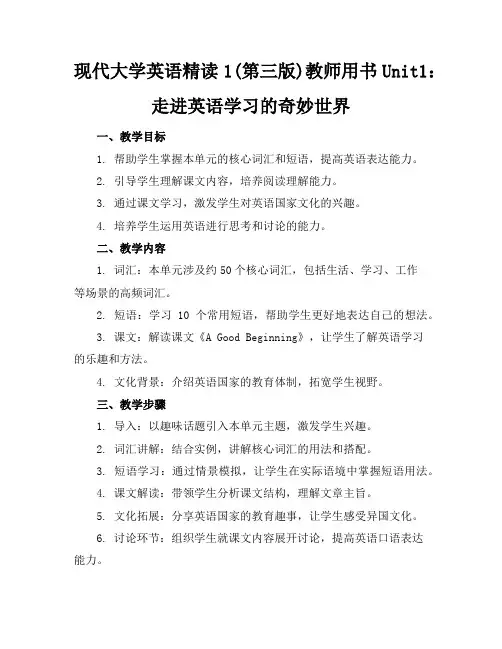
现代大学英语精读1(第三版)教师用书Unit1:走进英语学习的奇妙世界一、教学目标1. 帮助学生掌握本单元的核心词汇和短语,提高英语表达能力。
2. 引导学生理解课文内容,培养阅读理解能力。
3. 通过课文学习,激发学生对英语国家文化的兴趣。
4. 培养学生运用英语进行思考和讨论的能力。
二、教学内容1. 词汇:本单元涉及约50个核心词汇,包括生活、学习、工作等场景的高频词汇。
2. 短语:学习10个常用短语,帮助学生更好地表达自己的想法。
3. 课文:解读课文《A Good Beginning》,让学生了解英语学习的乐趣和方法。
4. 文化背景:介绍英语国家的教育体制,拓宽学生视野。
三、教学步骤1. 导入:以趣味话题引入本单元主题,激发学生兴趣。
2. 词汇讲解:结合实例,讲解核心词汇的用法和搭配。
3. 短语学习:通过情景模拟,让学生在实际语境中掌握短语用法。
4. 课文解读:带领学生分析课文结构,理解文章主旨。
5. 文化拓展:分享英语国家的教育趣事,让学生感受异国文化。
6. 讨论环节:组织学生就课文内容展开讨论,提高英语口语表达能力。
7. 作业布置:巩固所学知识,为下一节课做好准备。
四、教学建议1. 针对不同水平的学生,适当调整教学难度和进度。
2. 创设生动、有趣的教学情境,提高学生的学习积极性。
3. 注重培养学生的自主学习能力,鼓励学生课外阅读英语文章。
4. 定期进行课堂互动,关注学生的发音、语法等细节问题。
5. 结合实际生活,让学生在实践中感受英语的魅力。
五、教学方法1. 互动式教学:采用提问、小组讨论等形式,让学生在互动中学习,提高课堂参与度。
2. 情境模拟:通过角色扮演、情景对话等方式,让学生在真实语境中运用所学知识。
3. 任务驱动:设计一系列学习任务,引导学生主动探索、解决问题,培养解决问题的能力。
4. 多媒体辅助:利用音频、视频等资源,丰富教学手段,提高学生的学习兴趣。
六、课堂活动设计1. 词汇接龙:让学生轮流用本单元学到的词汇进行接龙,巩固记忆。
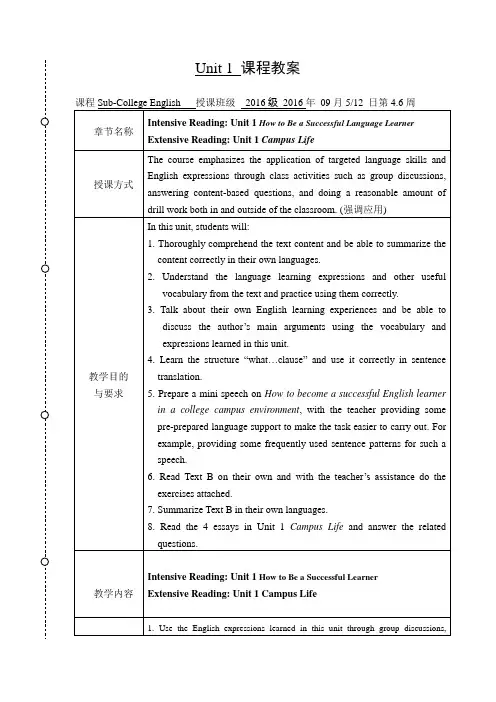
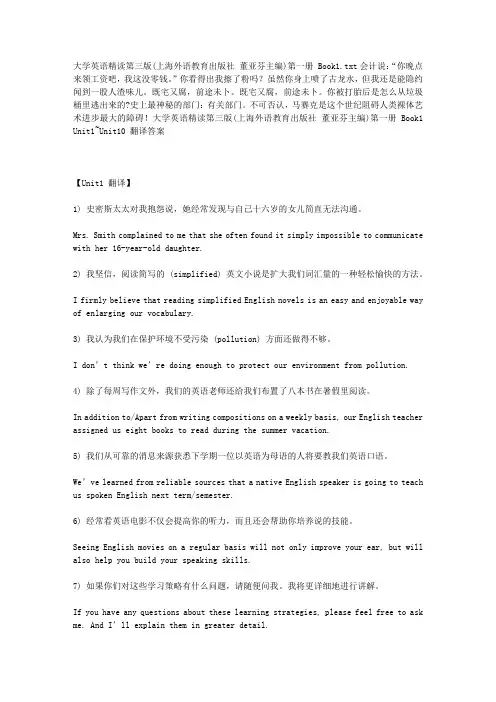
大学英语精读第三版(上海外语教育出版社董亚芬主编)第一册 Book1.txt会计说:“你晚点来领工资吧,我这没零钱。
”你看得出我擦了粉吗?虽然你身上喷了古龙水,但我还是能隐约闻到一股人渣味儿。
既宅又腐,前途未卜。
既宅又腐,前途未卜。
你被打胎后是怎么从垃圾桶里逃出来的?史上最神秘的部门:有关部门。
不可否认,马赛克是这个世纪阻碍人类裸体艺术进步最大的障碍!大学英语精读第三版(上海外语教育出版社董亚芬主编)第一册 Book1 Unit1~Unit10 翻译答案【Unit1 翻译】1) 史密斯太太对我抱怨说,她经常发现与自己十六岁的女儿简直无法沟通。
Mrs. Smith complained to me that she often found it simply impossible to communicate with her 16-year-old daughter.2) 我坚信,阅读简写的 (simplified) 英文小说是扩大我们词汇量的一种轻松愉快的方法。
I firmly believe that reading simplified English novels is an easy and enjoyable way of enlarging our vocabulary.3) 我认为我们在保护环境不受污染 (pollution) 方面还做得不够。
I don’t think we’re doing enough to protect our environment from pollution.4) 除了每周写作文外,我们的英语老师还给我们布置了八本书在暑假里阅读。
In addition to/Apart from writing compositions on a weekly basis, our English teacher assigned us eight books to read during the summer vacation.5) 我们从可靠的消息来源获悉下学期一位以英语为母语的人将要教我们英语口语。
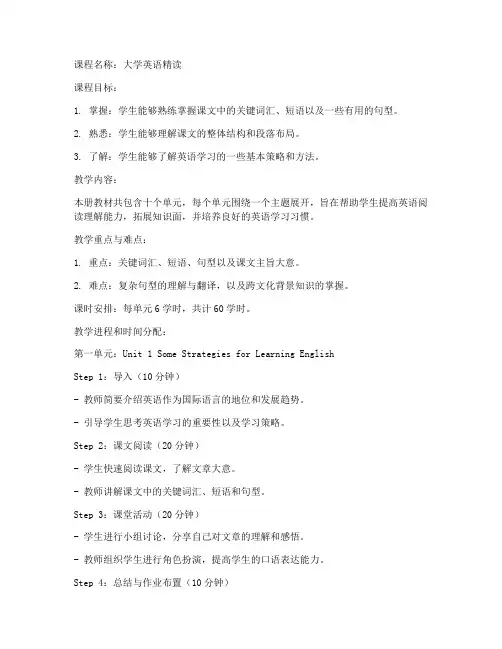
课程名称:大学英语精读课程目标:1. 掌握:学生能够熟练掌握课文中的关键词汇、短语以及一些有用的句型。
2. 熟悉:学生能够理解课文的整体结构和段落布局。
3. 了解:学生能够了解英语学习的一些基本策略和方法。
教学内容:本册教材共包含十个单元,每个单元围绕一个主题展开,旨在帮助学生提高英语阅读理解能力,拓展知识面,并培养良好的英语学习习惯。
教学重点与难点:1. 重点:关键词汇、短语、句型以及课文主旨大意。
2. 难点:复杂句型的理解与翻译,以及跨文化背景知识的掌握。
课时安排:每单元6学时,共计60学时。
教学进程和时间分配:第一单元:Unit 1 Some Strategies for Learning EnglishStep 1:导入(10分钟)- 教师简要介绍英语作为国际语言的地位和发展趋势。
- 引导学生思考英语学习的重要性以及学习策略。
Step 2:课文阅读(20分钟)- 学生快速阅读课文,了解文章大意。
- 教师讲解课文中的关键词汇、短语和句型。
Step 3:课堂活动(20分钟)- 学生进行小组讨论,分享自己对文章的理解和感悟。
- 教师组织学生进行角色扮演,提高学生的口语表达能力。
Step 4:总结与作业布置(10分钟)- 教师总结本节课的重点内容。
- 布置课后作业,包括课文翻译、词汇练习和阅读理解。
第二单元:Unit 2 My First JobStep 1:导入(10分钟)- 教师简要介绍职业选择的重要性以及求职技巧。
- 引导学生思考自己的职业规划。
Step 2:课文阅读(20分钟)- 学生快速阅读课文,了解作者的第一份工作经历。
- 教师讲解课文中的关键词汇、短语和句型。
Step 3:课堂活动(20分钟)- 学生进行小组讨论,分享自己的求职经历。
- 教师组织学生进行模拟面试,提高学生的面试技巧。
Step 4:总结与作业布置(10分钟)- 教师总结本节课的重点内容。
- 布置课后作业,包括课文翻译、词汇练习和阅读理解。
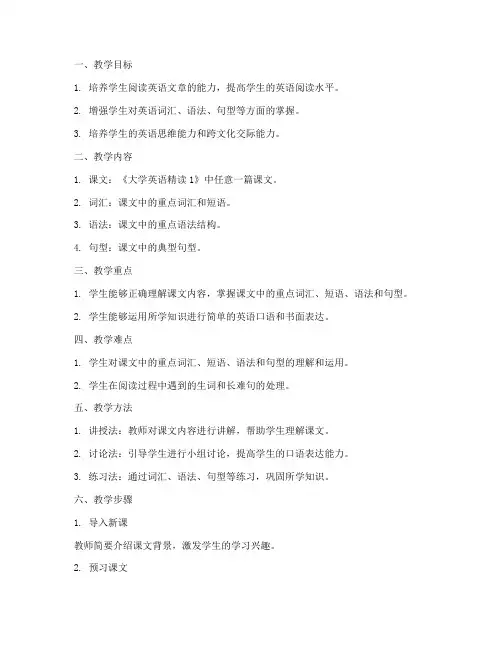
一、教学目标1. 培养学生阅读英语文章的能力,提高学生的英语阅读水平。
2. 增强学生对英语词汇、语法、句型等方面的掌握。
3. 培养学生的英语思维能力和跨文化交际能力。
二、教学内容1. 课文:《大学英语精读1》中任意一篇课文。
2. 词汇:课文中的重点词汇和短语。
3. 语法:课文中的重点语法结构。
4. 句型:课文中的典型句型。
三、教学重点1. 学生能够正确理解课文内容,掌握课文中的重点词汇、短语、语法和句型。
2. 学生能够运用所学知识进行简单的英语口语和书面表达。
四、教学难点1. 学生对课文中的重点词汇、短语、语法和句型的理解和运用。
2. 学生在阅读过程中遇到的生词和长难句的处理。
五、教学方法1. 讲授法:教师对课文内容进行讲解,帮助学生理解课文。
2. 讨论法:引导学生进行小组讨论,提高学生的口语表达能力。
3. 练习法:通过词汇、语法、句型等练习,巩固所学知识。
六、教学步骤1. 导入新课教师简要介绍课文背景,激发学生的学习兴趣。
2. 预习课文学生自读课文,找出生词、短语和难句,做好笔记。
3. 词汇讲解教师对课文中的重点词汇和短语进行讲解,帮助学生理解和记忆。
4. 语法讲解教师对课文中的重点语法结构进行讲解,帮助学生掌握语法知识。
5. 句型讲解教师对课文中的典型句型进行讲解,帮助学生运用句型进行表达。
6. 阅读理解教师引导学生阅读课文,回答相关问题,检查学生对课文内容的理解。
7. 小组讨论学生分组讨论课文内容,分享自己的观点和感受。
8. 练习巩固教师布置相关练习,让学生巩固所学知识。
9. 总结归纳教师对本节课的内容进行总结,强调重点和难点。
10. 作业布置布置课后作业,要求学生完成相关练习。
七、教学评价1. 学生对课文内容的理解程度。
2. 学生对重点词汇、短语、语法和句型的掌握情况。
3. 学生在小组讨论和练习中的表现。
八、教学反思本节课的教学效果如何,学生是否掌握了所学知识,教学过程中存在的问题及改进措施。
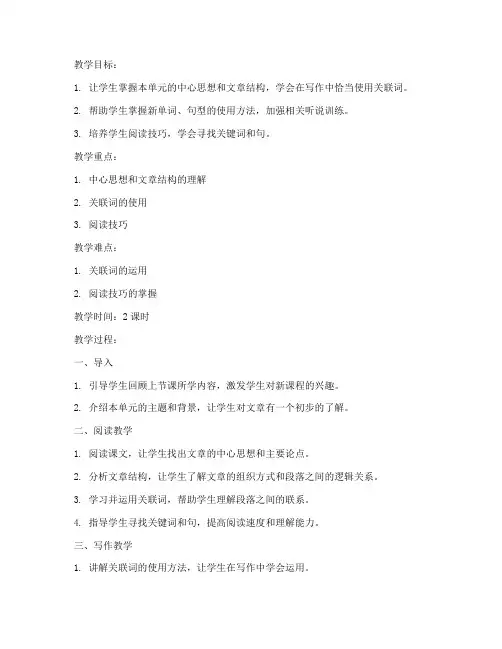
教学目标:1. 让学生掌握本单元的中心思想和文章结构,学会在写作中恰当使用关联词。
2. 帮助学生掌握新单词、句型的使用方法,加强相关听说训练。
3. 培养学生阅读技巧,学会寻找关键词和句。
教学重点:1. 中心思想和文章结构的理解2. 关联词的使用3. 阅读技巧教学难点:1. 关联词的运用2. 阅读技巧的掌握教学时间:2课时教学过程:一、导入1. 引导学生回顾上节课所学内容,激发学生对新课程的兴趣。
2. 介绍本单元的主题和背景,让学生对文章有一个初步的了解。
二、阅读教学1. 阅读课文,让学生找出文章的中心思想和主要论点。
2. 分析文章结构,让学生了解文章的组织方式和段落之间的逻辑关系。
3. 学习并运用关联词,帮助学生理解段落之间的联系。
4. 指导学生寻找关键词和句,提高阅读速度和理解能力。
三、写作教学1. 讲解关联词的使用方法,让学生在写作中学会运用。
2. 给学生提供写作素材,引导学生进行写作练习。
3. 鼓励学生相互交流,互相批改,提高写作水平。
四、课堂活动1. 组织学生进行小组讨论,分享阅读心得和写作经验。
2. 让学生上台展示自己的写作成果,教师进行点评和指导。
五、课后作业1. 复习本单元所学内容,巩固知识点。
2. 完成课后阅读练习,提高阅读技巧。
3. 根据所学知识,写一篇关于关联词使用的作文。
教学评价:1. 通过课堂提问、小组讨论、写作练习等方式,评价学生对本单元知识的掌握程度。
2. 关注学生的阅读速度和理解能力,以及关联词的运用情况。
3. 评价学生的写作水平,包括文章结构、内容、语言表达等方面。
教学反思:1. 在教学过程中,关注学生的个体差异,因材施教。
2. 营造良好的课堂氛围,激发学生的学习兴趣。
3. 注重培养学生的自主学习能力,提高学生的综合素质。
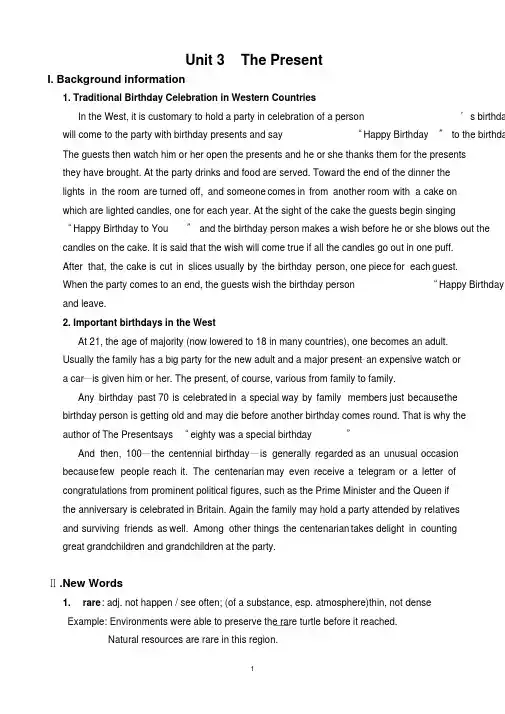
Unit 3 The PresentI. Background information1. Traditional Birthday Celebration in Western CountriesIn the West, it is customary to hold a party in celebration of a person’s birthda will come to the party with birthday presents and say “Happy Birthday” to the birthda The guests then watch him or her open the presents and he or she thanks them for the presentsthey have brought. At the party drinks and food are served. Toward the end of the dinner thelights in the room are turned off, and someone comes in from another room with a cake onwhich are lighted candles, one for each year. At the sight of the cake the guests begin singing“Happy Birthday to You” and the birthday person makes a wish before he or she blows out the candles on the cake. It is said that the wish will come true if all the candles go out in one puff.After that, the cake is cut in slices usually by the birthday person, one piece for each guest.When the party comes to an end, the guests wish the birthday person “Happy Birthday and leave.2. Important birthdays in the WestAt 21, the age of majority (now lowered to 18 in many countries), one becomes an adult.Usually the family has a big party for the new adult and a major present—an expensive watch ora car—is given him or her. The present, of course, various from family to family.Any birthday past 70 is celebrated in a special way by family members just because t he birthday person is getting old and may die before another birthday comes round. That is why theauthor of The Presentsays “eighty was a special birthday”.And then, 100—the centennial birthday—is generally regarded as an unusual occasion because few people reach it. The centenarian may even receive a telegram or a letter ofcongratulations from prominent political figures, such as the Prime Minister and the Queen ifthe anniversary is celebrated in Britain. Again the family may hold a party attended by relativesand surviving friends as well. Among other things the centenarian takes delight in countinggreat grandchildren and grandchildren at the party.Ⅱ.New Words1.rare: adj. not happen / see often; (of a substance, esp. atmosphere)thin, not denseExample: Environments were able to preserve the rare turtle before it reached.Natural resources are rare in this region.The higher we go above the earth, the rarer the air is.Would you like it rare, medium, or well-done?★rare / scarce① rare: 长期缺少而珍贵的东西,还可以表示“频率低的,罕见的,缺少的”如:a rare book珍本,a rare metal稀有金属。

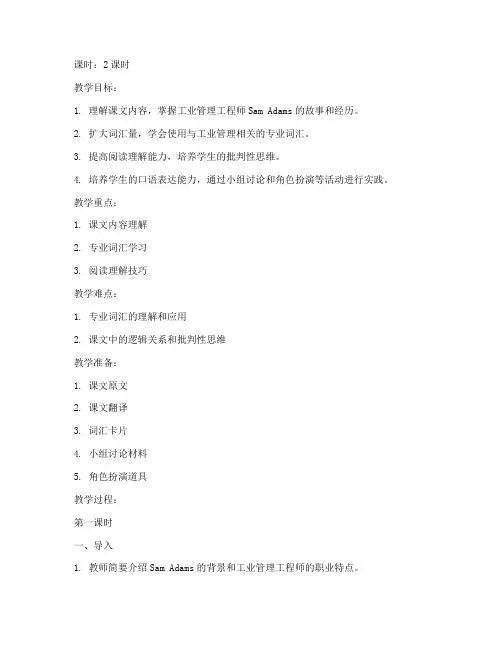
课时:2课时教学目标:1. 理解课文内容,掌握工业管理工程师Sam Adams的故事和经历。
2. 扩大词汇量,学会使用与工业管理相关的专业词汇。
3. 提高阅读理解能力,培养学生的批判性思维。
4. 培养学生的口语表达能力,通过小组讨论和角色扮演等活动进行实践。
教学重点:1. 课文内容理解2. 专业词汇学习3. 阅读理解技巧教学难点:1. 专业词汇的理解和应用2. 课文中的逻辑关系和批判性思维教学准备:1. 课文原文2. 课文翻译3. 词汇卡片4. 小组讨论材料5. 角色扮演道具教学过程:第一课时一、导入1. 教师简要介绍Sam Adams的背景和工业管理工程师的职业特点。
2. 学生自由发言,分享自己对工业管理工程师的理解。
二、课文精读1. 学生朗读课文,注意语音、语调。
2. 教师带领学生分析课文结构,讲解课文中的关键信息。
3. 学生分组讨论课文中的重点内容,如Sam Adams的职业生涯、遇到的挑战等。
三、词汇学习1. 教师展示词汇卡片,讲解课文中的专业词汇。
2. 学生跟读、拼写、造句,加深对词汇的记忆。
四、课堂小结1. 教师总结本节课的主要内容,强调重点和难点。
2. 学生复述课文中的关键信息,巩固所学知识。
第二课时一、复习1. 学生朗读课文,复习课文内容。
2. 教师提问,检查学生对课文的理解。
二、小组讨论1. 学生分组讨论课文中的问题,如Sam Adams如何提高衬衫厂的效率?2. 小组代表分享讨论结果,其他学生补充。
三、角色扮演1. 学生根据课文内容,选择角色进行角色扮演。
2. 角色扮演过程中,学生运用所学词汇和语法知识。
四、课堂小结1. 教师总结本节课的主要内容,强调重点和难点。
2. 学生复述课文中的关键信息,巩固所学知识。
五、作业布置1. 学生完成课后练习题,巩固所学知识。
2. 预习下一课内容,为下节课做好准备。
教学反思:本节课通过精读课文、词汇学习、小组讨论和角色扮演等活动,使学生掌握了课文内容,提高了阅读理解能力和口语表达能力。
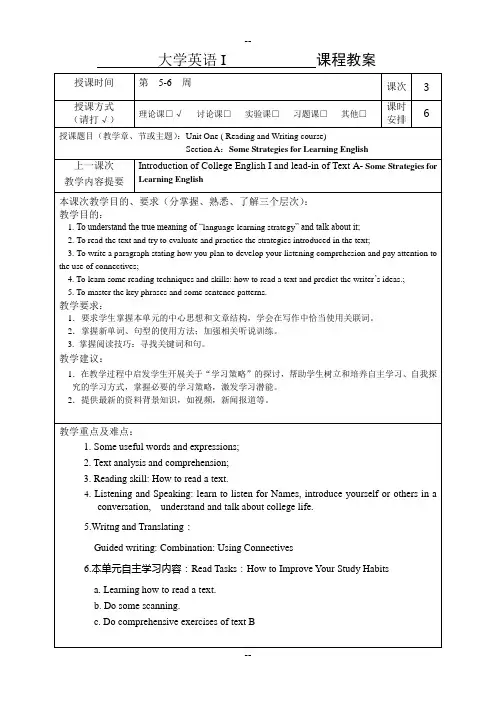
教案一:Unit 1 Your College YearsI. Teaching PlanThis essay is planned to finish in 20 minutes.1-3 mins Warming-up & Pre-reading4-17 mins While-reading18-20 mins Post-readingII. Teaching Aims:1. Knowledge aims(1) Students can understand and master the new words and expressions.(2) Students can master the main grammar.2. Ability aims(1) Students can understand the main idea through listening to tape.(2) Students can express their attitudes toward the article in English.(3) Enhance students' reading ability and skills of guessing new wordsin context.3. Emotion aims(1) Help students to understand the university life(2) Improve students' sense of cooperative learning.III. Teaching Methods:Task-based method, Grammar-translation method.IV. Teaching Difficult / Key Points:1. GrammarParallel structure, Object clause2. Writing techniquesV. Teaching Contents:Step 1: Warming upLead in the topic by providing some basic backgrounds.1. BackgroundAuthor -- Bob HartmanBob Hartman is a storyteller of children and part - time pastor. He was born in Pittsburgh in the United States.(Justification: Help students to know about the author and understand the essay better.)Step 2: Pre-readingAsk students to have a free talk:1.In the 1st college year, did you experience anything different fromthat in high school?2.What do you think about these differences?(Justification: Arouse interest of students.)Step 3: While-reading1. New Words(1)Endeavor v. to try very hardeg. He endeavored to claim himself down but in vain.辨析:Endeavor强调愿望发自内心以及用异乎寻常的极大努力去做某事,尤指克服困难。
大学英语精读第三版第一册课后习题全部答案大学英语精读第三版第一册课后习题全部答案11)e2)g3)j4)a5)b6)i7)c8)d9)h10)f1)2)3)4)5)大学英语精读第三版第一册课后习题全部答案6)7)8)9)10)11)12)13)14)1)2) a3)4)5)6)7) t8)1)3) 4) 5) 6) 7) 8) 9)10)11)12)13)14)15)16)17)18)19)20)2)3)4)1)2)3)4)1)2)3)4)5)6)7)1)2)大学英语精读第三版第一册课后习题全部答案3)4)5)6)1)2)3)4)5)1)2)3)4) 's5) '1) a .2) , I .3) .大学英语精读第三版第一册课后习题全部答案4) a , .5) 2004, a 110 , .1) , ’t .2) , .3) ’s , I ’t .4) , .1)2)3)4)5)6)7)8)9)10)11)12)大学英语精读第三版第一册课后习题全部答案1)2)3)4)5)6)7)8)9)10)11)12)1)2) a3)4)5)6)7)8)9)10) a翻译1) 史密斯太太对我抱怨说,她经常发现与自己十六岁的女儿简直无法沟通。
. 16 .2) 我坚信,阅读简写的() 英文小说是扩大我们词汇量的一种轻松愉快的方法。
I .3) 我认为我们在保护环境不受污染() 方面还做得不够。
I ’t ’ .4) 除了每周写作文外,我们的英语老师还给我们布置了八本书在暑假里阅读。
a , .5) 我们从可靠的消息来源获悉下学期一位以英语为母语的人将要教我们英语口语。
’ a .6) 经常看英语电影不仅会提高你的听力,而且还会帮助你培养说的技能。
a , .7) 如果你们对这些学习策略有什么问题,请随便问我。
我将更详细地进行讲解。
, . I’ .8) 那个加拿大女孩善于抓住每个机会讲汉语。
这就是她为什么三年不到就熟练地掌握了汉语口语的原因。
#### 课题名称:《大学英语精读1》#### 教学目标:1. 掌握:理解并熟练运用课文中出现的重点词汇、短语和句型。
2. 熟悉:了解课文结构,提高阅读理解能力。
3. 了解:掌握英语阅读技巧,提高英语综合运用能力。
#### 教学内容:1. 课文内容:Unit 1 - Unit 42. 重点词汇:每个单元精选20个重点词汇,包括动词、名词、形容词和副词。
3. 短语:每个单元精选10个常用短语。
4. 句型:每个单元精选5个典型句型。
#### 教学方法:1. 讲授法:教师讲解课文内容,分析词汇、短语和句型。
2. 案例分析法:通过实例分析,帮助学生理解课文内容。
3. 讨论法:组织学生进行课堂讨论,提高学生的英语口语表达能力。
4. 练习法:通过练习题,巩固学生对课文内容的理解。
#### 教学过程及时间分配:第一课时1. 导入新课(10分钟)- 简要介绍本单元的主题和背景。
- 引导学生思考与主题相关的问题。
2. 预习课文(10分钟)- 学生快速浏览课文,了解文章大意。
- 教师提问,检查学生对文章大意的掌握。
3. 讲解重点词汇、短语和句型(15分钟)- 对每个单元的重点词汇、短语和句型进行讲解。
- 结合例句,帮助学生理解和记忆。
4. 案例分析(10分钟)- 分析课文中的典型句子,讲解其结构、意义和用法。
- 引导学生总结阅读技巧。
第二课时1. 课堂讨论(15分钟)- 学生分组讨论课文中的某个话题,提高口语表达能力。
- 教师巡视指导,纠正发音和语法错误。
2. 练习题讲解(15分钟)- 学生完成课后练习题,教师讲解答案和解析。
- 强调易错点和难点。
3. 总结与反馈(10分钟)- 教师总结本单元的重点内容。
- 学生反馈学习过程中的问题和困惑。
4. 作业布置(5分钟)- 布置课后作业,包括词汇、短语和句型的复习,以及课文阅读。
#### 教学评价:1. 课堂参与度:观察学生在课堂上的发言和参与情况。
2. 课后作业完成情况:检查学生的课后作业,了解其对课文内容的掌握程度。
Unit One How to Be a Successful Language LearnerI. Objectives1) Reading: comprehending the text and knowing some strategies about how to be asuccessful language learner2) Writing: using the focus words and patterns to make sentences3) Translation: developing basic translation skillsII. Important Points and Special Difficulties1) Word power: associate; all over again; various, represent, get away from, analogy;break down into; depend on, substitute; bundle; convert; in terms of; previous; etc.2) Usage: take, go3) Structure: what … clauseIII. Teaching MethodsExplaining, classroom discussion, listening and skill-practicingIV. Teaching MaterialsBlackboard, multi-media facilities, audio-visual equipment, CAI teaching plansV. Teaching ProceduresTime arrangement: 4 class hours should be guaranteed on this lesson1st—2nd period: (90 minutes)Warm-up activities: 10 minutesWords and expressions: 30 minutesV ocabulary activities: 25minutesUnderstanding the text: 10 minutesListening and speaking exercises: 15 minutes3rd ---4th period: ( 90 minutes)Revision or quiz: 10 minutesDetail study of Text A: 40minutesSummary and discussion: 10minutesExercises to the text: 20 minutesText B tutoring: 10 minutesPre-class requirement:Students are required to preview the new words, read aloud and listen to the text.Text A Learning to Think All Over AgainStep 1 Warm-up activities1. Introductory remarksLearning another language is not easy. But most people can learn one if they are willing to put in the necessary time and use methods that work best for them. In this text, Graham E. Fuller, an expert in languages, gives you a very useful tip about learning a foreign language.2. Warm-up questions:1).How many years have you been studying English?2).Do you think English is easy to learn?3).What do find difficult to learn in English?4).Do you have any plan on studying English after you get into the college?5).How to learn English well? /What’s the efficient way to learn English?Here are some hints:1). Learning English requires action.2). Enjoyment leads to better memory.3). Work on your motivation.4). Improve your English, improve your life.Here are some examples of things you will have to do:◇Read a book in English for an hour every day, looking up words in an English dictionary.◇Listen to an audio book or other recordings in English, stopping it frequently, trying to understand what is being said, and trying to imitate(模仿) the speaker’s pronunciation.◇Spend your afternoon practicing the pronunciation of the English.◇Walk down the street and build simple English sentences in your head (talking to yourself in English about the things you see around you).Teacher may sum up like th is: “Practice makes perfect.” We must try our best to find time and chances to practice what we have learned. Without practice, without efforts, English will forever remain foreign. Now let’s come to the text to see wh at the author say about it.3. T asks Ss to go over the text to get the main idea,Then answer the questions on page 8 based on the text.Step 2 Language points:1. Word usage1. foreign:foreign country, foreign goods, foreign policyDishonesty is foreign to his nature.(having no relation to)2. process:Wrinkles is part of the aging process.In the process of doing sth.:我们还在适应新环境的过程中。
中南财经政法大学武汉学院外语系《大学英语1》(专科)课程教案Teaching Plan for College English (Book 1) Foreign Languages Department of Wuhan College, ZNUEL任课教师签名:Lecture NotesBefore Reading:Introductory RemarksA British adventurer, Francis Chichester traveled round the world alone in a small boat called the “Gipsy Moth IV” in spite of the fact that he had lung cancer. This text tells us briefly what happened to him on his voyage. To begin with, let’s draw a map of Chiceester’s course.Warming-up1. DiscussionTeacher: Before we study the text, let me ask you some questions.1) Do you like traveling? Do you like traveling alone?2) What do you think is the most important for a person who suffer from lung?2. Questions about the TextBased on the title, guess what the text is about.Question: Who sailed round the world, and how?3. Information Related to the Text1) Sir Francis ChichesterBorn in Devon, Britain, in 1901, Sir Francis Chichester later became a British adventurer. As a young man, he went to New Zealand, where he worked as a miner, salesman and land agent.After returning to England in 1929, he made a solo flight to Australia in a biplane. Two years later, in 1931, he piloted the first east-west flight over the Tasman Sea between New Zealand and Australia. He then planned to fly around the world, but the plane was severely damaged in an accident in Japan.After World War II he founded a business in London. Taking up ocean sailing in 1953, he won the first solo transatlantic race in 1960 by sailing the “Gipsy Moth IV” from Plymouth to New York City in 40 days.2) Knights and KnighthoodKnights were the highest class of fighting men in Europe during the Middle Ages. There were other classes of fighting men, such as the lowly foot soldiers. But the knights, who fought on horseback, were the aristocrats of the battlefield. The great heroes of the time, both in story and in fact, were knights.By the year 1,500 the time of the knight as fighting man was over. But knighthood did not die out altogether. Today in Great Britain, knighthood is an honorary award given to outstanding people in recognition of some remarkable work they have done. A man with the rank of knight is called “Sir” (prefixed to his whole name or given name, but not to his surname alone), an d his wife “Lady”. A woman with the same rank is called “Dame”.When a person is being honored, the King or Queen usually takes his or her sword or borrows one from someone present at the ceremony. The person about to be knighted kneels on one knee and bows his head respectfully in front of the King or Queen. The King or Queen touches with the sword first the left shoulder of the person bowing before him or her then the right shoulder and finally the top of the bowed head. While doing this the King or Queen says, “We dub thee Sir _____.”3) Sir Francis Drake (1540 – 1596)English naval explorer, once the vice-admiral of the British Navy. After several slave-trading expeditions to West Africa and the Spanish Main (1566 – 1573), he sailed round the globe in the Golden Hind (1577 – 1580). He managed to tie down the Spanish Armada by raiding Cadiz (1587), and helped defeat the Spanish attempt to invade England (1588). To historians, he is controversial figure. The British regard him as a national hero while many in other countries think of him as a pirate.Global ReadingComprehension of the Text1. Multiple Choice1) Who was Chichester? (Key: D)A) A single-handed man.B) A British man.C) An Australian man.D) A British adventurer.2) Before Chichester began his sailing, he was _______. (Key: B)A) a businessmanB) a pilotC) a teacherD) a doctor3) How old was he when he decided to start his voyage round the world? (Key: B)A) 58.B) 65.C) 66.D) 55.4) What do you know about his boat? (Key: C)A) Its name was Gipsy.B) It was 60 meters long.C) Its name was Gipsy Moth.D) It was 16 meters wide.2. Answer the following questions based on the text:1) What happened to Francis Chichester in 1931?2) How old was he when he started his voyage round the world?3) What was the name of his boat? What was the length of the boat?4) What route did Chichester follow in sailing around the world?5) How many miles did he cover on the first half of his voyage?6) What did his friends in Sydney try to dissuade him from doing?7) In what way was the second half of his voyage the more dangerous part?8) What happened to Chichester on the night of January 30?9) How did Chichester feel after sailing round Cape Horn?10) How was he received when he arrived back in England?11) What title is added to his name when a man becomes a knight?12) How many miles did the second half of the voyage cover?Text Organization1. What type is the text?A. narrationB. expositionC. descriptionD. argumentationKey (A)Words &Expressions1. set out: i. begin a journeyii. begin a course of actionAt sixty-five Francis Chichester set out to sail single-handed round the world.2. single-handed: adj. & adv. 单独的(地)The job cannot be done single-handed.She accomplished the task by her single-handed efforts.Para. 21. give up: stop doing or having (something)一位老者在公共汽车上把座位让给一位抱着孩子的妇女。
第一章教学安排的说明章节题目:Unit 1 Some Strategies for Learning English学时分配:本章六学时:一至三学时为课文讲授;四至六学时为练习和听力训练本章教学目的与要求:1. 按大纲要求使学生了解必要的文化背景知识。
2. 按大纲要求讲授单词、语法、句型等英语语言文化知识。
3. 按大纲要求提高学生英语听书读写各方面的能力。
其它:参考书目《大学英语精读第一册教师用书》、《大学英语星火学习手册》、《大学英语语法练习册》课堂教学方案课题名称:Unit 1 Some Strategies for Learning English--- Text课文讲授授课时数:三学时(Teaching Time: 3 hours)授课类型:理论课Students’ level: non-English majors of the second semester of the 1st year.教学方法与手段:讲授、讨论、指导、多媒体教学目的要求(Teaching Objectives):1、Teach the students how to study English in the college.2、Let the student share their good study habits with others.3、Make the students understand the structure pattern of an expository writing.4、About the text, Ss should grasp the text content, text structure, basic vocabularies and require grammatical points of the section.教学重点、难点:1)Words:average;case;commit;occupy;concentrate;enable;adequate;organize;double;mention;confuse; purpose; permanent2)Phrases & Expression:fill in; decide on ; be aware of; set aside; as well; look over; make useof ; go over; lead to3)Grammar:as well, so…that…;too…to …; as…as…教学内容及组织安排(Teaching Procedures):I. Pre-reading ActivitiesStep one (presentation)2.Make sure that they can pronounce each new word in the vocabulary3.Explain the important words with examplesVocabulary:average: a.ordinary; normale.g. What is the monthly income of an average family in Lanzhou?I was average in my class though I had hoped I would better? mean(平均的)e.g. The average age of the students in that class is 20.The average income of these teachers is 1000 yuan per month.n. (collocation) on (the) average: taking account over a periode.g. When he was a student in that university, he failed one subject per year onaverage.case: (multimodal word)1.actual condition, actual state of affairs.e.g. Is it the case that you fail the examination?in any case: whatever happens or may have happenede.g. in any case, I will arrive there at 8 tomorrow.In no case: in no circumstances.e.g. In no case should we give in .(predicate use inversion)in case: because of the possibility of sth. happening.e.g. Take an umbrella with you in case it (should) rain/rains.in case of: if sth. Happens e.g. In case of the rain, take a shelter.In the case of: as to e.g. In the case of my elder sister, she doesn’t like surfing the net addition: n.(1) in addition: besides. e.g. In addition, he studies French well .(2)in addition to sb./sth.e.g. When I was a middle school student I read a romantic novel inaddition to a hysterical novel every month.commit:vt.(1) decide to give (time,money,etc.) for special usage.e.g. They are committing money to offer the opportunity education ofaccepting to the poor children.(2) perform: e.g. commit suicide, errors, a crime, a mistake.(3) commit oneself to: make oneself responsible; under take.e.g. She has committed herself to give birth to a child for him. occupy: take up, fill(1)be occupied in (doing) sth.: involved or busy.e.g. He is occupied in translating the modern Chinese novel into English.(2)occupy oneself in (doing) sth: fill one’s time or keep oneself busy.e.g.The young man occupied himself in making experiments.entertain: (1)entertain sb. at/to dinner;(2) entertain sb. Withe.g. The householder/host entertain the guests with a feast/big dinner. aware:be/ become aware of :e.g.Lin fully aware of the gravity of the situation.enable: (1)enable sb. to do sth.e.g. The student’s identity cards enable the students to travel by train on halfprice.(2) enable sth.e.g.The support of the committee members enabled the passage ofthe bell.(3) “en+ noun/adjective”: change the word to be verb , meaning ”e.g . en+large=enlarge(to make large) en+rich=enrich( to make rich) adequate: (1) as much as one needs:a. suggesting the amount is satisfactorye.g. There hundred yuan per month is not adequate to support a family ofthree in a city.b. enough:(of quality) as great as is needed. It is the most general term.e.g. Live got enough of you.(too much complaint)c. sufficient: enough, written language.(literary language)e.g. Toby’s father has saved sufficient money to support his college study.(2)suitable ; fit collocation: be adequate to (doing) sth.e.g. Do you think he is adequate to (accomplishing) the task? concentrate(on/upon):vi. pay close attention tovt. come or bring together at one place.e.g. concentrate all the forces.content: what is written in a book, etc.e.g. The contents of the book is printed in bold typeportion:a portion of …, (a series of, a species of)e.g. A large portion of his articles was published.A large number of his articles were published.mention: (1) vt. Speak or write about sth. In a few words.e.g.Do not mention to his wife that he started smoking again.(2) n. referring toe.g. At the mention of the headmaster, the pupil’s heart sank.(3) not to mention + v.inge.g.He can not walk, not to mention running.confused: adj. Be confused about.e.g. Lin confused about the difference between these expressions.attitude:(1) What are thinks about sth. or sb.attitude towards/to/aboutattitude of sb.e.g. What’s your attitude to/about/toward women’s rights?attitude towards the studentsattitude of the students(2) pose, man ner of hiding one’s body.e.g. He stood there in a menacing attitude.课堂练习或讨论、布置作业:1. T asks Ss to come out the main idea, structure of the text (10mins)2. T summarizes the main idea and structure of the text (5 mins)课堂教学方案课题名称:Unit 1 Some Strategies for Learning English--- listening & Practice听力及练习授课时数:三学时(Teaching Time: 3 hours)授课类型:理论课Students’ level: non-English majors of the second semester of the 1st year.教学方法与手段:讲授、讨论、指导、多媒体教学目的要求(Teaching Objectives):1、Teach the students how to study English in the college.2、Let the student share their good study habits with others.3、Make the students understand the structure pattern of an expository writing.4、About the text, Ss should grasp the text content, text structure, basic vocabularies and require grammatical points of the section.教学重点、难点:1)Words:average;case;commit;occupy;concentrate;enable;adequate;organize;double;mention;confuse; purpose; permanent2)Phrases & Expression:fill in; decide on ; be aware of; set aside; as well; look over; make useof ; go over; lead to3)Grammar:as well, so…that…;too…to …; as…as…教学内容及组织安排(Teaching Procedures):II. While-reading Activities1. Ss have the silent reading on the text (10 mins)2. Let the students read the questions after the text first. Then explain the text to thestudents. The following are the difficult sentences:a.sounds too good to be true.(Introduction)b.This is not necessarily the case, however.(L.3)c.Yes, even students of average intelligence can be top students withoutadditional work.d.Fill in committed time such as eating, sleeping, meetings, classes,etc.(L.6-7)e.Skimming helps double your reading speed and improve youcomprehension as well.f.Review important points mentioned in class as well as points you remainconfused about.After that, let the students answer those questions.3. Teacher asks Ss to come out the main idea, the structural organization of the text. (10 mins)4. Teacher summarizes the main idea, the structures of the Section A. (5 mins)The structure of the text:a.introduction (para.1)b.Body (Para.2-7)c.Conclusion (para.8)III. Post-reading Activities1. Let the students do the exercises in the text-book that are related to the new words.2. Ss hand in the summary of the text.3. Ss discuss the questions on the topic related to the text.✓Do you have any other effective study habits or techniques?✓Divide the class into small groups. Each group is about 5-6 students.✓In the group, one will be appointed group leader, another secretary and a third oral reporter.4. Let the students do the other exercises in the test book and check the answers together under the instruction of the teacher.课堂练习或讨论、布置作业:Writing第二章教学安排的说明章节题目:Unit 2 Sailing Round the World学时分配:本章六学时:一至三学时为课文讲授;四至六学时为练习和听力训练本章教学目的与要求:1. 按大纲要求使学生了解必要的文化背景知识。